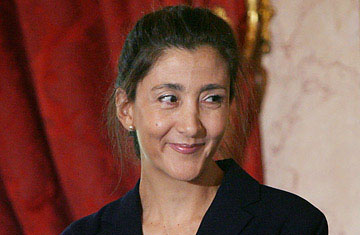
Ingrid Betancourt is received at the French National Assembly in Paris.
In the seven days since she emerged from six and a half harrowing years as a FARC hostage in the Colombian jungle, Ingrid Betancourt has been canonized by the media. And Saint Ingrid has responded with inspiring grace and cool. She was feted at a glam-glitz reception by a rapturous Nicolas Sarkozy within hours of touching down in Paris on July 4. The fine features of the Paris-raised Colombian now grace countless magazine covers, replacing the gaunt image that had been prevalent until last week, one taken from a proof-of-life video and hung on city halls across France in solidarity. This week's Paris Match cover shows her laughing on a rooftop terrace in cashmere sweater and pearl earrings, with 40 pages inside about her "six years in Hell."
Hell it certainly was: Betancourt was chained for 12 hours a day to a tree, subjected to grueling 10-hour marches, ravaged by poisonous plants and insects, and terrorized by ruthless guards. And those are just the details we know about. She admits that worse — perhaps including sexual threats — remain concealed, probably until she writes her memoirs. Now she's planning to visit the Pope, and on Monday will receive the Legion of Honor from Sarkozy at a Bastille Day ceremony. Meanwhile, Chile's President Michelle Bachelet has said she intends to nominate Betancourt for a Nobel Peace Prize. Little wonder that the Financial Times (not usually breathless) asked last week: "Ingrid — A New Mandela?"
But Betancourt's biggest problem ahead could be this: Nelson Mandela emerged from 27 years in jail in 1990 with his huge political movement intact and a nation to run. Mandela's leadership was unquestioned. In stark contrast Betancourt has emerged as a lone woman with no political constituency and no clear home, geographically or politically. (She has apparently also left her husband in Bogota, after giving him a perfunctory hug the day she was freed.) That outsider status is familiar ground for Betancourt, who was raised not among the poor masses, as Mandela was, but as an aristocratic expatriate on the plush Avenue Foche in Paris, where her father was a diplomat.
Despite Betancourt's obvious charisma and attractiveness, she had not a fig's chance of winning her 2002 campaign for the Colombian presidency at the time of her kidnapping. Her Green Oxygen Party had only one parliamentarian, who came from the area to which she traveled disastrously the day FARC rebels nabbed her. This past week Betancourt has said she does not know yet when she will return to Colombia, or what exactly her role will be. But she clearly has her eye on returning to Colombian politics, having penned a 190-point program while she was a hostage. And her giant fame could reignite her prospects: About 31% of Colombians polled the day she was freed said they would vote for her for president, and Jorge Londono, who runs the Invamer-Gallup polling company in the South American country, told The Guardian newspaper that the survey showed that "undoubtedly she will be an important player."
But first comes psychological healing. During an interview with the New York Times on Thursday (the audiotape of which was shared with Newsweek, TIME and National Public Radio), when asked if she might have a breakdown, Betancourt, who is poetically articulate in English, French and Spanish, admitted she senses that moment is coming. "It's like the roaring of the waves," she said. "I know it's getting closer. I know it's time for me to stop because I don't want to be submerged by depression."
The transition is familiar to Georges Malbrunot, a Paris correspondent for Le Figaro newspaper, who spent four months as a hostage in Iraq in 2004, before being released and flown back to Paris to intense media attention. "When you get out you have a euphoria. Everybody likes you. They introduce you around. You are a kind of saint," he tells me. "And then if you don't move on from being an 'ex-hostage' you can get into trouble." What strikes Malbrunot after watching hours of Betancourt's televised interviews this week is her quiet command of her extraordinary situation, which suggests that Betancourt will not sink into confusion. "I do not think she'll fall into that trap," he says. "She seems strong. But you never know."
During the Thursday interiew, Betancourt was asked what was next for her. She paused, then said: "Six days ago I was chained to a tree.... I'm just trying to understand how I'm going to live from now on."
